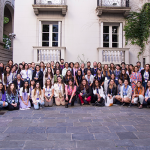A Meeting to Discuss AI’s Development and its Impact on the Labor Market
Chicas en Tecnología (CET) organized a day to discuss the challenges and opportunities that Artificial Intelligence represents in the labor market and how it impacts the gender gap in STEM disciplines. The goal was to encourage the exchange of ideas and promote concrete actions so that AI’s development creates new labor inclusion possibilities.
The event was held at ÁreaTres and gathered ambassadors from the Chicas en Tecnología’s programs, representatives from the educational field, private and public sectors, journalists, and civil society organizations.
“Over the last few months, the talks on artificial intelligence’s development have speeded up, raising uncertainty among young people and our allies about how these advancements will impact the professional market integration of current and future generations. On the one hand, artificial intelligence brings new opportunities and entices us to create innovative developments. On the other hand, it challenges us to think collectively about how to ensure that these technologies do not magnify the existing stereotypes and gaps but become a tool that promotes real inclusion of fully diverse women in the technological fields,” said Paula Coto, Executive Director of Chicas en Tecnología.
The Meeting with the Ecosystem had a discussion panel joined by Martín Sciarrillo, Director of Data and Artificial Intelligence at Microsoft Spanish South America (SSA), and Vanesa Cillo, Senior Director of Engineering at Salesforce. The people who took part in the event had a moment to ask questions and exchange comments and proposals with the speakers.
“We pretend that the algorithms created by humanity are free of bias when humanity is full of biases; we pretend that it is free of discrimination when humanity is full of discrimination. The thing is that, based on how we do things as a society, technology will join us along the way,” were Martín Sciarrillo’s words in the panel.
“Artificial Intelligence can reduce the gender gap with natural language interpretation and makes it possible to gain knowledge without being able to read or write. But if there is no Internet connection or access to a computer, then we cannot talk about artificial intelligence,” Vanesa Cillo said.
Furthermore, a networking space took place, during which interdisciplinary groups established axes of action that contribute to transforming the technological field into an inclusive and diverse space where women can lead digital innovation processes.
Chicas en Tecnología has the purpose of reducing the technology gender gap in Argentina and Latin America. To do so, it is crucial to analyze the impact of Artificial Intelligence’s developments on the professional market integration of young women in the region.





